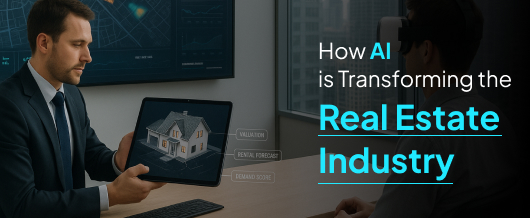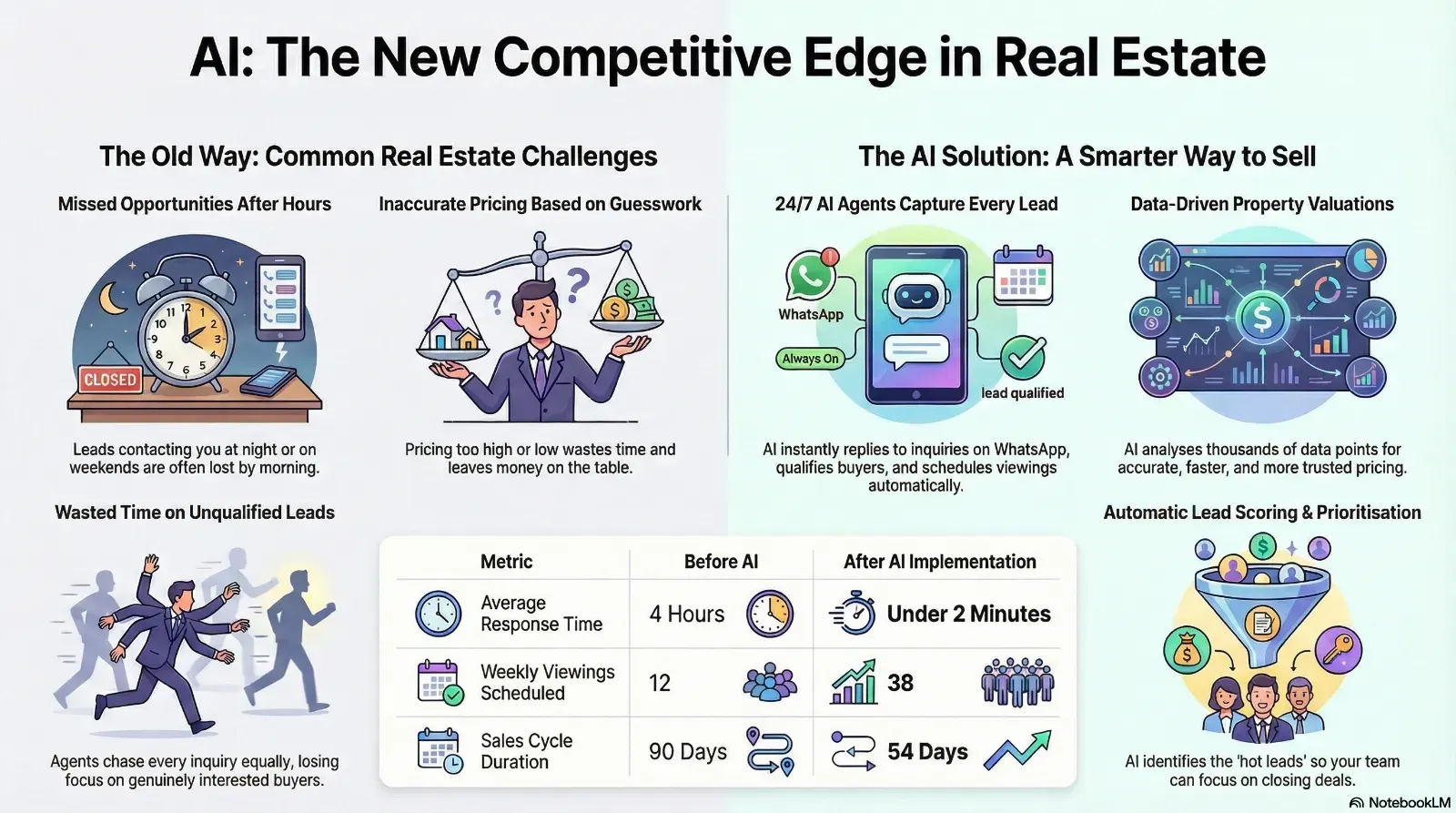Real estate used to be simple. You knew people. You showed them houses. You made deals.
That’s still part of it. But the game has changed.
Today, a buyer doesn’t call you first. They search online. They compare properties. They read reviews. They message you on WhatsApp at midnight.
If you don’t reply in 30 minutes? They’re already talking to someone else.
Your competitors aren’t just other agents anymore. They’re systems. Algorithms. AI that never sleeps.
This isn’t about replacing the human touch. It’s about keeping up. It’s about being everywhere at once. It’s about making smarter decisions faster.
The real estate agents and brokers winning right now? They’re using AI. Not because it’s trendy. Because it actually works.
What You Need to Know (The Quick Version)
Here’s what AI does for real estate right now:
✓ Finds qualified buyers and sellers automatically.
✓ Replies to inquiries 24/7 without your team.
✓ Predicts which properties will sell fastest.
✓ Tells you which leads to chase first.
✓ Manages WhatsApp, calls, and emails at scale.
✓ Schedules property viewings without manual back-and-forth.
✓ Predicts market trends and property values.
✓ Gives agents insights they never had before.
The result? Faster sales. Smarter decisions. Less manual work. More money.
But here’s the thing, most brokers still don’t know this exists. That’s your advantage.
ROI Snapshot: The Real Impact of AI Implementation
AI in Real Estate Industry Is Redefining Every Part
Let’s zoom out for a second.
AI isn’t just one thing in real estate. It’s everywhere.
When a buyer is looking at homes online, AI is learning what they like. Location? Size? Price range? It’s all being tracked.
When you’re trying to price a property, AI is analyzing 10,000 data points. Comparable sales, neighborhood trends, interest rates, market velocity. No guessing.
When someone sends an inquiry, AI is reading between the lines. “Hey, is this place near schools?” They don’t just need a house. They need a family neighborhood. AI in real estate industry figures that out.
Your marketing? AI is showing your listings to the right people. Not just anyone. The people most likely to buy.
Your team’s calendar? AI is filling it with actual appointments from actual qualified leads. Not spam inquiries.
This is the shift. From human intuition to data-backed decisions. From “I think this will sell” to “data says it will sell in 47 days.”
That’s a different business entirely.
Predicting Property Value (Before Anyone Else Does)
Here’s where it gets interesting for your bottom line.
Pricing a property wrong costs money. Price too high? It sits. Price too low? You leave money on the table.
AI doesn’t guess. It analyzes.
AI tools look at comparable properties that actually sold. Not just “similar” properties. The exact right comparables. It checks the neighborhood. Schools, crime, future development. It sees market trends nobody else noticed.
It knows interest rates are changing. It knows that affects buyer budgets. It adjusts.
Tools like HouseCanary and Zillow’s Zestimate do this. They give you a data-backed price range. Not a guess. A calculated prediction.
Better pricing means homes sell faster. Faster sales mean more commissions. More commissions mean more business.
Plus, when you show a buyer data-backed pricing? They trust you more. That trust turns into listings. Into referrals. Into repeat business.
Finding the Right Buyers and Sellers (Using AI, Not Luck)
Most brokers still rely on luck and relationships.
“Maybe someone will call.” “Maybe the right buyer will find my listing.” That’s not a strategy.
AI-driven marketing is different.
Here’s how it works: You have a listing. An expensive home in a specific neighborhood. AI looks at who’s actually searching for that property type in that area. It finds them on Facebook, Instagram, Google.
It shows your listing to people who fit the buyer profile. Young families? Retirees? Investors? AI knows who wants what.
But it doesn’t stop there. AI tests different versions of your ad. Different photos. Different headlines. It watches which version gets clicked most.
Then it stops showing the bad version and doubles down on the good one.
CRM tools like HubSpot, Freshsales, and Follow Up Boss do lead scoring automatically. They track which leads are serious and which are just browsing.
Your team sees a list of “hot leads” first thing in the morning. Real opportunities. Not tire-kickers.
The payoff? Higher ROI on your ad spend. More qualified leads. More closed deals.
The Game-Changer: AI Agents Working 24/7
This is where it gets powerful.
Imagine this scenario:
It’s 11 PM on a Sunday. A buyer sees your listing on Zillow. They have questions. They message you on WhatsApp: “Is this property still available? What’s the neighborhood like?”
In the old world, they wait until Monday morning. Probably message a competitor instead.
With AI Agents, something different happens.
An AI Agent replies instantly. “Yes, it’s available. Here’s the neighborhood info. Here are 3 photos. Want to schedule a viewing?”
The buyer is impressed. They’re already thinking you’re responsive and professional.
But here’s what’s really happening behind the scenes:
The WhatsApp Agent isn’t alone. A Lead Qualification Agent is reading the conversation. It’s figuring out: Is this buyer serious? What price range? What’s their timeline?
Meanwhile, a Voice AI Agent is ready. If the buyer needs more info, they can call. No waiting. Just conversation.
Everything gets logged automatically. No manual data entry. Your team sees a complete record of this lead: every message, every question, every interest signal.
Here’s the stack that makes this work:
- WATI or Zoko for WhatsApp replies.
- VAPI.ai or Yellow.ai for voice calls.
- Zapier or Make to connect everything.
- Google Sheets or your CRM to store everything.
One buyer. One system. Zero missed opportunities. Zero manual follow-ups.
Scale this to 100 inquiries a day? Your team would need 10 people to do this manually. The AI Agent system handles it all.
Personalization at Scale (How AI Knows What Each Buyer Wants)
Here’s something that blows people’s minds.
AI can remember thousands of conversations. What each person asked. What they liked. What their budget was. When they’re ready to move.
A buyer looked at 3 condos last month. They seemed interested in urban living. AI remembers.
This month, a new condo listing appears in downtown. AI sends it to that specific buyer. “Hey, remember you were looking at condos? We just listed this one. Your price range. Downtown location like you wanted.”
That’s personalization. Not spam. Actual “this is relevant to you” messaging.
Your AI Agent can even be smart about timing. Don’t send messages at 6 AM. Send them when that specific buyer usually checks their phone. Data shows that happens at 7 PM on weekends? Send it then.
The buyer feels like you remember them. That you care. That you’re thinking about them specifically.
That’s not manipulation. That’s good service backed by data.
And it builds loyalty. Buyers who feel seen become repeat customers. They send referrals. They leave reviews.
One AI system doing this across 500 leads? That’s impossible manually. With AI? It’s automatic.
Virtual Tours That Actually Sell
Photos are okay. But AI-powered visualization? That’s different.
Tools like Matterport create 3D walkthroughs. A buyer can walk through a home on their phone. They can see every corner without being there.
Some tools go further. AI staging lets buyers see what a room could look like with different furniture. Empty living room? AI shows what it looks like with a couch, TV, plants. That helps buyers imagine themselves there.
ReimagineHome does this. A house feels empty and cold? AI stages it virtually. Suddenly it feels warm. Inviting. Like home.
Why does this matter? Buyers make emotional decisions. They see themselves in the space. AI creates that experience before they ever visit in person.
Less showing time for you. More qualified visitors when they do come.
Some AI even analyzes which rooms to photograph first. Which angles sell best. Which features to highlight. Again, data and not guessing.
The Tools That Power This (Your Real Estate AI Stack)
So you want to start. What do you actually use?
For Lead Management and Scoring:
HubSpot – tracks leads, scores them automatically, sends follow-ups.
Freshsales – built for real estate. CRM plus lead scoring built in.
Follow Up Boss – older school but still trusted. Lead management focused.
For WhatsApp Automation:
WATI – send replies automatically, broadcast campaigns, integrates with your CRM.
Zoko – handle queries on WhatsApp, schedule viewings, qualify leads.
Twilio API – if you want to build custom.
For Voice AI (Phone Calls):
VAPI.ai – AI answers calls, qualifies leads, books appointments.
Yellow.ai – handles conversations, transfers to humans when needed.
Cognigy – enterprise-level conversational AI.
For Market Analysis and Valuation:
HouseCanary – property valuation, market predictions.
Skyline AI – predictive analytics for investment properties.
Zillow API – data feeds, comparables, trend data.
For Virtual Tours and Staging:
Matterport – 3D tours that impress buyers.
Styldod – AI staging, furniture visualization.
ReimagineHome – virtual staging powered by AI.
To Connect Everything:
Zapier – automate workflows, connect tools that don’t normally talk.
Make – same idea, different interface.
Pabbly – budget-friendly automation.
The secret? Pick tools that work together. If your WhatsApp system can’t talk to your CRM? You’ve lost the whole benefit. Integration is everything.
What Happens When You Actually Implement This (Real Numbers)
Numbers matter. Let’s talk about what brokers are actually seeing.
A brokerage in Toronto started using AI Agents for WhatsApp 6 months ago. They weren’t special. Just a regular mid-size team.
Before:
- Response time: average 4 hours.
- Lead follow-up: manual, inconsistent.
- Viewings scheduled per week: 12.
After AI Agents:
- Response time: under 2 minutes.
- Lead follow-up: automatic and consistent.
- Viewings scheduled per week: 38.
That’s 3x more appointments from the same lead flow.
Closing rate went up too. Why? Because hot leads got followed up instantly instead of forgotten for hours.
Another brokerage implemented lead scoring with AI. Their agents used to chase every lead equally.
With AI scoring, agents stopped wasting time on cold leads. They focused on hot ones.
Result? Sales cycle dropped from 90 days to 54 days. Commission velocity increased 40%.
A developer in Vancouver used predictive analytics to price properties. They reduced pricing errors by 78%. Homes that used to sit for 120 days now sold in 67 days on average.
Less carrying cost. Faster money. Higher profit per deal.
These aren’t anomalies. These are real results from real people.
The Honest Conversation: Privacy, Trust, and Letting Humans Lead
Look, AI feels scary to some people.
“Will robots replace me?” “Is this ethical?” “What about my clients’ data?”
Valid questions. Let’s talk about them.
First: Privacy. Your AI system needs to follow the rules. GDPR in Europe. DPDP Act in India. State laws in the US. Canadian regulations in Canada.
You’re not doing anything shady. You’re just storing what clients tell you. What they’re already comfortable sharing. AI is just organizing it.
Second: Human touch. AI doesn’t replace agents. It replaces paperwork and waiting time.
Your agent doesn’t answer “what’s the neighborhood like” 50 times a day. The AI does. Your agent spends that time actually connecting with serious buyers.
That’s not less human. That’s more human where it matters.
Third: Transparency. Tell your clients you use AI. Most people understand it’s just helping you serve them better.
What breaks trust? Pretending everything is personal when you’re using a form letter. Clients hate that.
But saying “I use AI to reply quickly and remember all your preferences” people respect that.
Finally: Oversight. Your team should review sensitive conversations. Make sure the tone is right. Make sure nothing weird happened.
AI is a tool. A smart tool. But humans are still driving.
Where Real Estate Is Heading (The Next 5 Years)
Here’s the honest future.
AI is moving from reactive to predictive.
Right now: AI replies to inquiries. Next: AI will predict which neighborhoods will boom before they boom.
A developer can see that area is getting new transit, new schools, new investment. AI connects those dots. “Buy here now, sell in 3 years, make 40%.”
Investors win by being early. Early used to mean relationships and luck. Soon it’ll mean data.
Multi-Agent Systems will get smarter. Right now they handle leads. Next they’ll handle negotiations.
An AI Agent will understand both sides of a deal. Buyer’s constraints. Seller’s needs. It’ll find middle ground automatically.
Your agent still closes the deal. But they’ll have a roadmap that AI created.
The real estate databases will all talk to each other. Your CRM, the MLS, property records, neighborhood data, investment trends. One connected ecosystem.
An agent will open one dashboard and see everything. Lead quality, market opportunity, property value, buyer profile. All in one place.
Brokerages that figure this out first will own their market.
Not because they’re smarter. Because they moved first.
The Bottom Line: Real Estate, Powered by Data and Automation
Real estate is changing. It’s not theoretical anymore.
The agents closing the most deals right now? They’re using AI. The brokers growing fastest? They’re automating. The properties selling quickest? They’re priced and marketed with data.
You can ignore this. You can do things the way you always have. But your competitors won’t.
The buyer’s experience is changing. They expect fast replies. They expect personalized recommendations. They expect someone who remembers them.
That’s not possible at scale without AI. Not manually anyway.
But with AI? You can be everywhere at once. You can remember every conversation. You can offer the best service possible.
That’s not the future of real estate. That’s happening now.
The question for you is simple: Will you lead, or will you catch up?
Because the market doesn’t wait. And neither do your buyers.
Want to build your own AI tools? Contact Alamalak Technologies for AI Development Services.

 By: Rushik Shah
By: Rushik Shah



